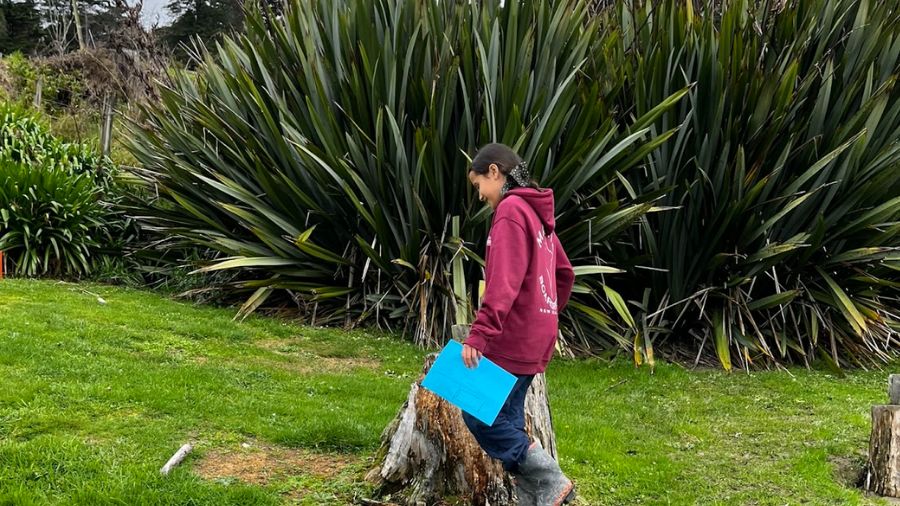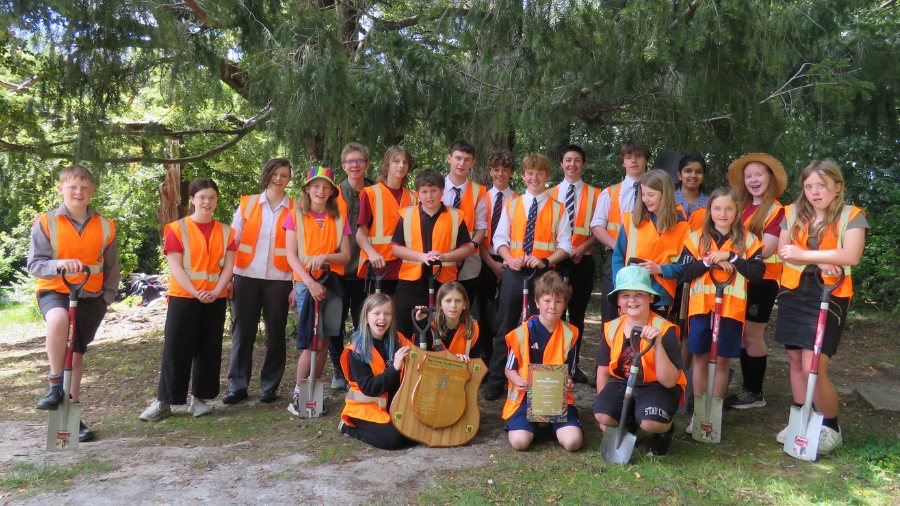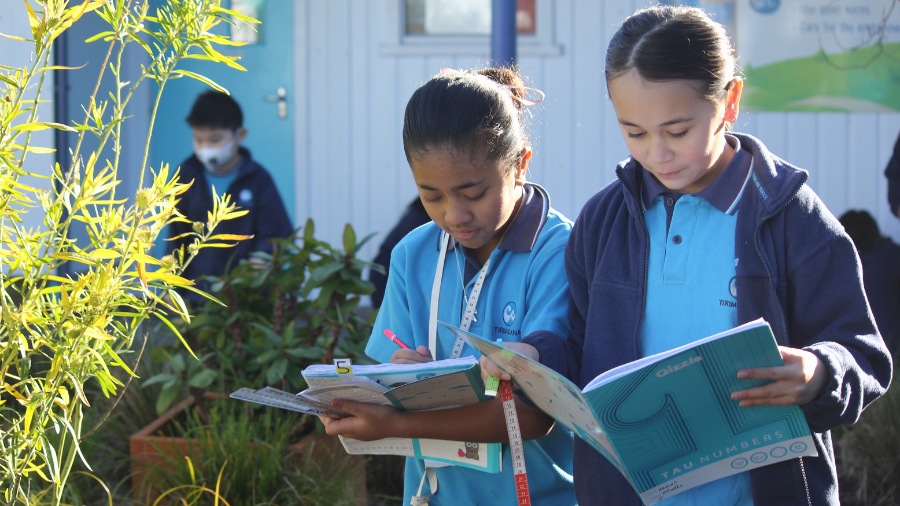This article was written by Paul Murray, Kaiārahi with Para Kore Marae Incorporated.
Re-published with permission from Te Whakatika: The Aotearoa New Zealand Professional Practice Journal for Outdoor and Environmental Learning, Issue 42 Autumn 2024 (in press).
Te Kauwhata Community Compost Hub
This is the story of a project undertaken by Para Kore, in collaboration with Te Kauwhata Primary School, the CarbonCycle company, and funded by the Waikato District Council to establish the first community compost hub in the district.
“The process has linked to our inquiry topics as we look at how we can look after our environment in our local histories curriculum.”
- Alice Kapoor, Enviroschools Lead Teacher, Te Kauwhata Primary
In a world fraught with environmental challenges, social inequalities, and food insecurity, imagine a scene where communities thrive with healthy, equitable, nutritious kai borne out of localised solutions.
Imagine hapū, iwi, schools, early childhood centres, community groups, local councils and businesses all collaborating to divert organic waste from landfill, reducing their greenhouse gas emissions and while creating a plentitude of nutrient dense soil - soil full of microbial life, at scale - furnishing local food growing schemes and producing an abundance of kai for the community.
This is not just a pipe dream but a tangible reality already in progress through the creation of community compost hubs.
At its core, the hot compost hub embodies the convergence of science, environmental education, Mātauranga Māori, community resilience, and sustainable food practices.
It serves as a platform for immersive learning, where soil science comes to life, revealing the intricate web of living systems that make life - and food - possible for us. It reminds us of our place within the interconnected web of life, that the health of any one system is entirely dependent on the health and wellbeing of all others.
The video below is a recording of Paul Murray, Te Kauwhata Primary School teacher Alice Kapoor and students Pearl and George sharing their story and learning from the project. Watch now (55 minutes) or continue reading the full article below.
Background: Oranga Taiao, Oranga Marae, Oranga Whānau
Para Kore Marae Incorporated is a kaupapa Māori, not-for-profit sustainability education organisation whose work contributes to building soil and kai sovereignty, which in turn supports climate justice and action. The mission of Para Kore is to educate and advocate from a Māori worldview to strengthen connection to Ranginui and Papatūānuku. Their programmes support marae, whānau, hapū, iwi, learning and education centres, and a wide array of community groups and entities to design out and reduce waste.
Te Kauwhata Primary School is located in the very centre of the northern Waikato town its name shares. The school has been on its own enviro journey for well over a decade and has already experienced the perks of interacting and working collaboratively with its community. The school gardens, a centre of learning, have also been a centre of income over the years through the carefully nurtured relationships with local businesses by way of selling their produce and by raising crops specifically as fundraisers. Rhonda Irvine, now retired, was the green-thumbed, enviro-enthusing teacher-aide whose classroom was ever and only the garden, through which all twelve classes were circulated for practical, hands-on learning.
“Those first kids had so much pride in the gardens and for themselves because they had a hand in building them and then they became our future garden leaders, teaching others all they had learnt, from seed saving to plate.”
- Rhonda Irvine, Community Gardener, Compost Hub Manager
Post retirement, Rhonda now leads the newly established Te Kauwhata Community Gardens located right across the road from Te Kauwhata Primary School on land provisioned by the Waikato District Council. Just a few doors down, is one of several early childhood centres in the town, Te Kauwhata Childcare & Learning Centre. Not far up the road is Te Kauwhata College.
The Problem
Food waste going into landfill is a big problem for a number of reasons: Greenhouse gas emissions, resource waste, landfill space, economic costs, food (in)security, food equity, the impact on natural systems and biodiversity to name a few.
Schools on the Ka Ora, Ka Ako | Healthy School Lunches Programme often face increased volumes of food waste going to landfill, and schools, like marae, community centres, and early childhood centres, do not qualify for kerbside food scrap collections that run in our bigger centres. Rural communities know about feeding their food scraps to pigs and chooks, but what about everyone else, like in Te Kauwhata, for example?
The Solution
The idea of a Community Compost Hub is to link up as many community entities as possible via a shared and collaborative resource that benefits everyone - a hot compost unit. Set up one of CarbonCycle’s vermin-proof, hot composting units central to a marae, a community centre, a high school, some primary schools, early childhood centres, or any other community entities, and you have the beginnings of a community compost hub. Note: Everyone would ideally be located within range of a food-scraps-carrying cargo bike.

The CarbonCycle Company has set up 70 community oriented compost hubs in Aotearoa New Zealand, nine of which are situated in schools as community hubs, with a further 60 schools having CarbonCycle systems that are used for education and food growing in the school. The inventor of this particular model of hot composting, the CarbonCycle composter, sums it up with this statement:
“Eliminate food miles, waste miles and compost miles. Good for the atmosphere, good for the planet, good for the people.”
- Richard Wallis, Inventor, CarbonCycle Composter
Why throw away your best resource for growing more food? Why drive it away somewhere else when it can be used to rebuild soil to grow more food right where you are. Doesn’t that make sense?
The connections to environmental learning are clear. Composting leads to climate change actions, reducing emissions, waste minimisation, ecosystem support, and landscape restoration.
Education at the Community Level
Te Kauwhata Primary School became the host for a new CarbonCycle hot composting system funded by the Waikato District Council with the aim that the nearby college, other neighbouring schools and early childhood centres will also contribute. As part of the proposal, the project budgeted for quarterly wānanga sessions at the compost for the first full year cycle of the compost making process. The wānanga are offered to all stakeholders and participants in the project.
“Our success was simple from new entrants to the seniors. They liked doing it, it was outside the classroom, the tasks were simple: digging, planting seeds, watering, weeding, and chatting about gardening. On wet days, it was researching topics they chose; bee keeping, watering systems, water sources, and fertilisers to use.” - Rhonda Irvine

However, the true winning factor in the ongoing success of maintaining a community compost hub, is having a compost manager - someone to oversee and coordinate the maintenance of the hot compost system lest it become a dumping ground.
The Para Kore project proposal also included the provision to employ a compost manager two hours per week for the first year, including multiple days of paid training with the CarbonCycle compost experts on site.
The goal of setting up a community compost hub is that the knowledge, skills and ownership of the community composting system is fully handed over to the community. The job of Para Kore is to support the establishment of the hub, but the true success of the project is seeing the learning, the understanding, and the actions of running a community compost taken over by the community.
“The compost hub wouldn’t be possible without Rhonda. We need heaps of Rhondas. I believe they are already in every community. Imagine collaborative funding for roles like this everywhere.“
- Ngakau Harris-Peke, kaiārahi Para Kore (Te Rarawa, Ngāpuhi, Ngāti Tamaterā, me Ngāti Hauā)
The idea of everyone being involved is fully embraced by Te Kauwhata Primary. The tamariki have been involved in every stage of this project, not only hands on, but hands deep in compost. Under the expert facilitation of the CarbonCycle crew, not a moment was lost to learning. The building of the compost structure itself and the establishment of the first compost box were opportunities to learn about microbiology, soil life, and the experiences of building and establishing effective compost systems.

At the next wānanga, the first turning of the compost, we learned more about the soil food web, the soil sponge, and healthy soil indicators. This is science in real life. Science in our hands, in our senses, in our physical memory banks. The smells and feels of healthy soil. The soil that grows our kai. The science of how to feed ourselves.
Here, the cycles of nature are not just studied but are actively participated in, as food waste is transformed into fertile soil in front of our very eyes, nourishing community gardens and closing the loop of consumption.
“Overall the kids participate because they can see the end result of zero food waste from the school and we have talked about the benefits of compost going back into the school gardens.”
- Rhonda Irvine, Compost Manager
Mātauranga Māori clearly articulates the inseparable connection we as people have to the whenua, the land, to Papatūānuku. We whakapapa to the land. We come from and return to the land. But in our living years, the land also grows the food that sustains our bodies. If we feed and nurture the land, the land feeds and nurtures us. The health of the soil is the health of our food which is the health of us. We are inseparable.
Composting our food waste honours the taonga we have taken and used, in this case, the nutrients from the soil, the plants, and the animals that fed our bodies, the leftovers of which, the ‘scraps’, ultimately become nutrients in return to regenerate the soil. This is an act of giving back and of keeping the story going, full circle.
“I don’t know if they understand how huge of a project this is, and how big this step is to normalise this kaupapa. What they’ve done is planted a seed for the tauira and this is going to continue growing.”
- Ngakau Harris-Peke, kaiārahi Para Kore (Te Rarawa, Ngāpuhi, Ngāti Tamaterā, me Ngāti Hauā)
As part of Māoritanga, respecting the sources of our provision, acknowledging our older tuakana siblings of the natural world, those aspects of the living world that were here before us, will be here after us, and which are providing for us and making all this possible - this is our motivation to take care of the source, to ensure the legacy of the abundance we have received from our tūpuna, is also there for our mokopuna and their mokopuna. Composting is another way of being a good ancestor.
“Riro taonga mai, hoki taonga atu.”
We receive valuable resources from Papatūānuku, we return valuable resources to her.
-Tuaiwa Rickard, (Ngāti Koata, Ngāti Toa, Tainui, Taranaki)
The scene is already looking more hopeful. Children are looking after the soil, watching it grow kai. We are driving less, buying less, and sharing more. We can all experience the abundance that local food growing projects offer. We have less waste and are making less of a mess. We’re learning to live in relationship with the natural world around us, te taiao.
Acknowledgements
Thank you to Paul Murray from Para Kore for sharing this inspiring story, along with his colleagues, kaiako and ākonga from Te Kauwhata Primary School, compost manager Rhonda Irvine and the wider community.
This project was made possible with funding from the Waikato District Council and project support from the CarbonCycle Company.
All images taken by Paul Murray and shared with permission.
Article main image caption:
Back row, L to R) Paul Murray (Para Kore), Richard Wallis (Inventor of CarbonCycle Hot Composters) Rhonda Irvine (Compost Hub Manager), Tania Nepe (Kaiako, Te Kauwhata Primary) , Russel Watson (Caretaker, Te Kauwhata Primary), Pam Murtagh (Matawhaanui Trust), Tim Bowater (CarbonCycle Company), Alice Kapoor (Lead Enviro Teacher, Te Kauwhata Primary, and the wonderful Te Kauwhata Primary kids.






